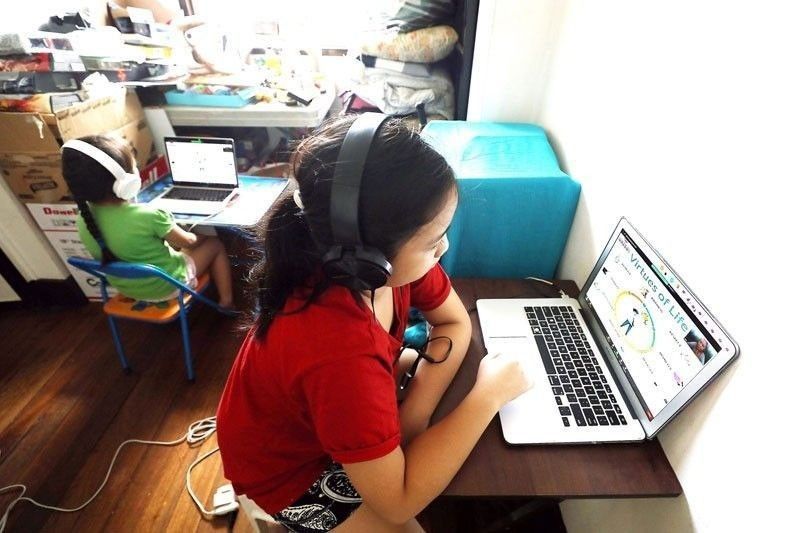Group's surveys air concern on 'looming learning crisis' in Philippines

MANILA, Philippines — Advocates pushing for education reform on Wednesday sought for swift action on a "looming learning crisis," revealing survey results from distance learning which included a decrease in student participation and confidence on the new setup.
Based on the findings of the Movement for Safe, Equitable, Quality and Relevant Education, some 54% of its teacher respondents said a "definite portion" of their class was lagging behind in the first quarter of the ongoing school year, 42% reporting an "indefinite segment" while only 4% saying all of their students are able to keep up with the lessons.
Such results were discussed in a webinar hosted by the Alliance for Concerned Teachers, and supports its statement last month that while education officials have yet to see signs of a massive dropout, participation in classes had been dismal.
The surveys, held separately for teachers, students and parents, were held in December of last year. Some 1,395 were teachers from public and private schools, 57.4% of which were from Metro Manila, 37.6% from rest of Luzon, 4.3% from Visayas and 3.2% from Mindanao.
From the said figure, more than a majority or 70.9% said they are not confident that learning competencies set by the education department under distance learning are being developed.
Further, 50.4% of teachers who took part in it said DepEd's printed modules were not sufficient for students' self-learning, against 24.5% who said it was enough.
Prof. Lizamarie Campoamor-Olegario from the University of the Philippines' College of Education said too that some 46.7% of teachers believe that the agency had not properly ensured their safety and health amid the pandemic.
Citing the study's recommendations, she said educators should be provided with healthcare kits, free COVID-19 testings, medical fund to assist those who have been infected, as well as free counseling or mental health programs, to name a few.
Students on difficulty in classes
As for confidence on distance learning, 53% out of the 620 Grades 4 to 12 students said they were not sure if they can learn the competencies set by DepEd for their grade level.
87% of them also cited unstable internet connection as their main difficulty in attending online classes, and 20% said lack of money to continue in it is a real problem.
More importantly, the group's survey on students showed 54.7% of them saying activities under distance learning have posed negative impacts on their physical and mental health.
"Isang malaking issue ang mental health dahil bukod sa pandemya, nadagdagan pa tayo ng hinaharap natin sa pag-aaral na hindi rin tayo sanay," said Olegario. "Hindi enough ang webinars para ma-address ang mental health ng teachers at ng mga estudyante, ito ay kailangan talaga ng programa."
(Mental health is really a big issue because aside from the pandemic, we have to face difficulties in a learning setup that we are not used to. Webinars are not enough to address the mental health problems of teachers and students, this would need a program.)
DepEd in November 2020 rolled out guidelines for an academic ease aimed to "reduce stress and anxiety" which include allowing schools to identify activities in learning modules that could be made optional so students and put more time on the "most essential activities." But the ACT had said that such did not provide concrete solution to the problem.
This year, some 25 million Filipino students had enrolled, a figure down by two million from the school year in 2019. Many from private institutions had opted to transfer too to public schools.
'Burdensome' costs of learning
Among parents, only 42.7% said they were confident that their children could understand their lessons. The survey for them yielded 1,207 respondents, mostly from cities, followed by those in rural areas and the least from those in poblacion districts.
Some 56% of them reported too that costs for distance learning a month was at P900 in the last month, while 44% had spent more than the said amount.
"Survey findings underscore the urgent need to address the major issues presented so as to salvage the remaining periods of the school year and thwart the long-term negative impacts of the health and economic crisis on education," the group said.
Seeking for government to address the prolonging difficulties as showed in the results, they called for sufficient funding for distance learning needs, as well as provision for necessary resources and technologies.
Adjustments should also be made in schools' curriculum and in the amount of work and study load given, as well as a "fine tuning" in the learning setup's overall design "to make it work more effectively."
There had been calls for government to draw up plans for the safe reopening of schools with vaccine-related developments, but DepEd and the Duterte administration have yet to determine the fate of physical classes.
Earlier today, Malacañang said proposals for resuming the pilot run shelved in late December 2020 in low-risk areas would be discussed in next week's Cabinet meeting.
- Latest
- Trending

































